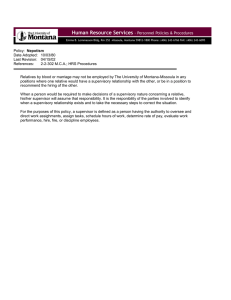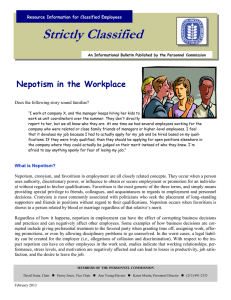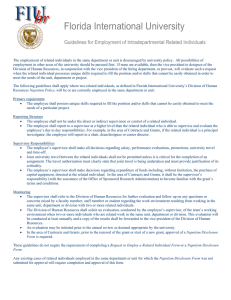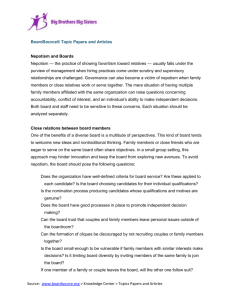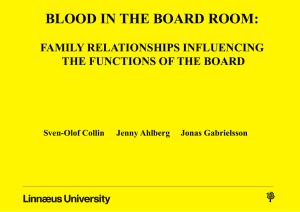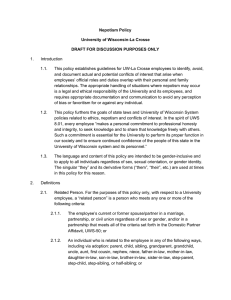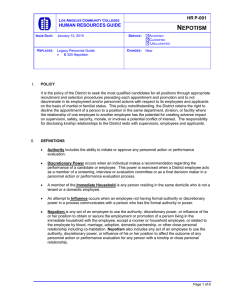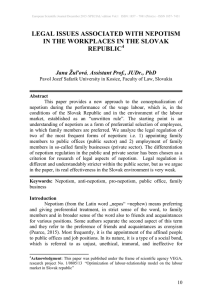Strictly Classified Nepotism in the Workplace
advertisement
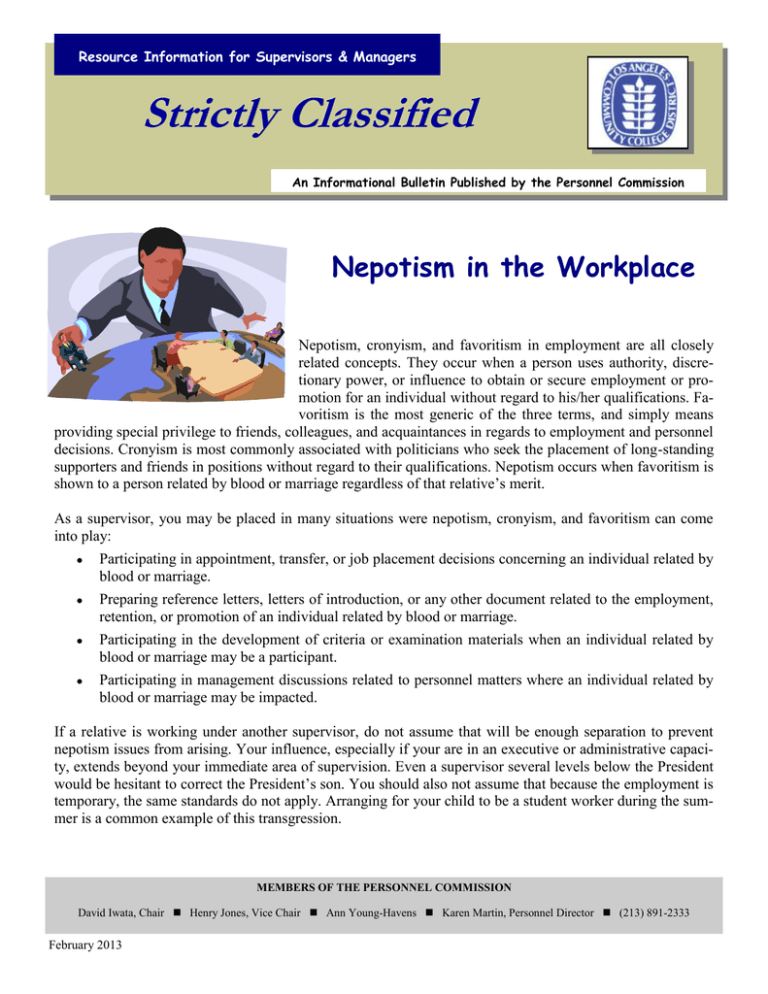
Resource Information for Supervisors & Managers Strictly Classified An Informational Bulletin Published by the Personnel Commission Nepotism in the Workplace Nepotism, cronyism, and favoritism in employment are all closely related concepts. They occur when a person uses authority, discretionary power, or influence to obtain or secure employment or promotion for an individual without regard to his/her qualifications. Favoritism is the most generic of the three terms, and simply means providing special privilege to friends, colleagues, and acquaintances in regards to employment and personnel decisions. Cronyism is most commonly associated with politicians who seek the placement of long-standing supporters and friends in positions without regard to their qualifications. Nepotism occurs when favoritism is shown to a person related by blood or marriage regardless of that relative’s merit. As a supervisor, you may be placed in many situations were nepotism, cronyism, and favoritism can come into play: Participating in appointment, transfer, or job placement decisions concerning an individual related by blood or marriage. Preparing reference letters, letters of introduction, or any other document related to the employment, retention, or promotion of an individual related by blood or marriage. Participating in the development of criteria or examination materials when an individual related by blood or marriage may be a participant. Participating in management discussions related to personnel matters where an individual related by blood or marriage may be impacted. If a relative is working under another supervisor, do not assume that will be enough separation to prevent nepotism issues from arising. Your influence, especially if your are in an executive or administrative capacity, extends beyond your immediate area of supervision. Even a supervisor several levels below the President would be hesitant to correct the President’s son. You should also not assume that because the employment is temporary, the same standards do not apply. Arranging for your child to be a student worker during the summer is a common example of this transgression. MEMBERS OF THE PERSONNEL COMMISSION David Iwata, Chair Henry Jones, Vice Chair Ann Young-Havens Karen Martin, Personnel Director (213) 891-2333 February 2013 Although not technically considered nepotism, relatives working together in the same unit can cause similar concerns and considerations to come into play. It is reasonable, and often common, for the relatives or friends of employees who are satisfied with their employer to seek employment with that organization. Collaterally, it is reasonable for the employer to assume that friend or relative may have similar work ethic and abilities as the loyal employee. However, when friends and relatives work together, the burdens of day-to-day supervision are complicated and increased. Decision-making in connection with the assignment and separation of personnel becomes more complicated. Stronger checks and balances need to be in place in these situations. Among all groups, loyalty to one’s fellow members is nearly absolute and usually overrides all other obligations. Friends and relatives in the same organization can breed misunderstanding and resentment on the part of other workers. Those who become aware of the relationship from outside the unit, including the general public, may rightly or wrongly perceive that the taxpayers' interests are not being addressed in a strictly impartial and objective manner. What is the District’s Policy Regarding Nepotism? Like most employers, the District prohibits all employees from using the authority, discretionary power, or influence associated with their positions to obtain or secure the employment or promotion of a person related by blood or marriage. However, there is an exception: If a relative has competed for employment through the District’s standard competitive examination process and is deemed by the hiring authority to be the best qualified for the position, he/she may be hired with the provision that either the employee or supervisor causing the nepotism situation be transferred at the first opportunity. If you want additional information regarding the District’s policy, please follow these links: Personnel Commission Rule 720: http://laccd.edu/perscom/documents/Rule720.pdf Personnel Guide B325: http://laccd.edu/personnel_guides/numerical_index.htm What Should You Do If You Encounter a Situation Where Nepotism May Exist? Err on the side of caution — Be up front about relationships you have that may become problematic. Employment applicants are asked to divulge this information on their employment application, but the information does not always filter down. You should never assume that a different name will hide the situation. Somehow, the relationship will eventually become known. Do not serve on interview panels where a family member is being interviewed. You will not be able to objectively evaluate your relative, or at the very least your objectivity will be placed in doubt by others. Do not try to influence the screening or interview process for employment or promotional opportunities where a family member is being interviewed. The conversation with a fellow supervisor or manager that you think is confidential may not be. This also includes refraining from writing letters of recommendation or introduction. If you become aware of a situation involving nepotism, advise your college administration, typically the Vice President of Administrative Services, of your concern. You may also contact the Division of Human Resources or Personnel Commission with such information. We all have a personal responsibility to uphold the standards that we set for ourselves and to act in ways that maintain and improve the reputation of the District.
